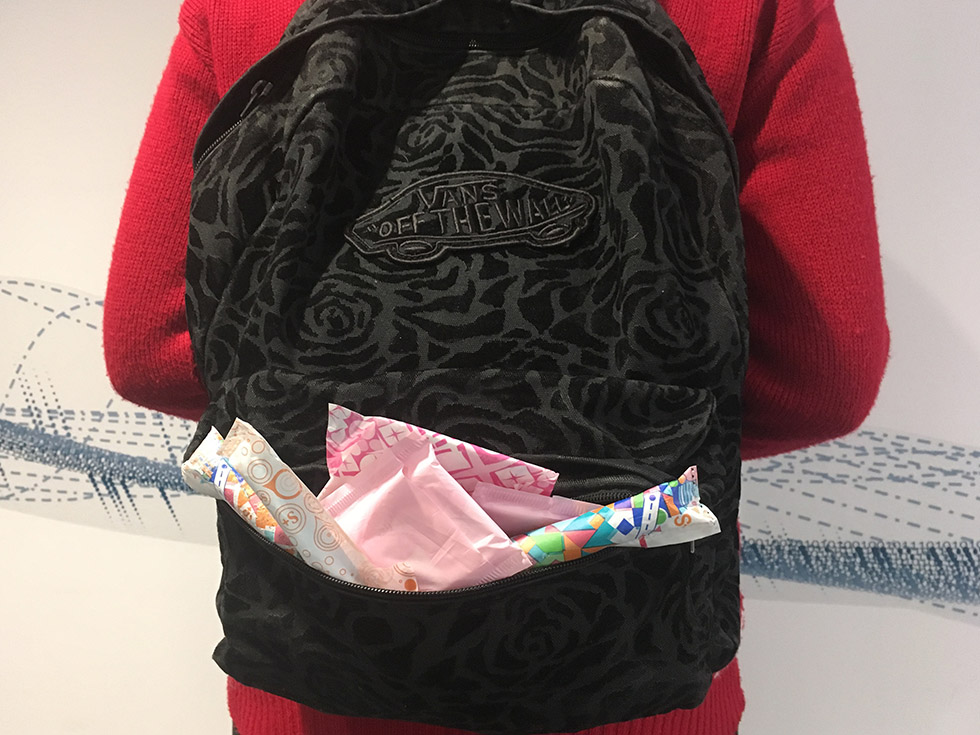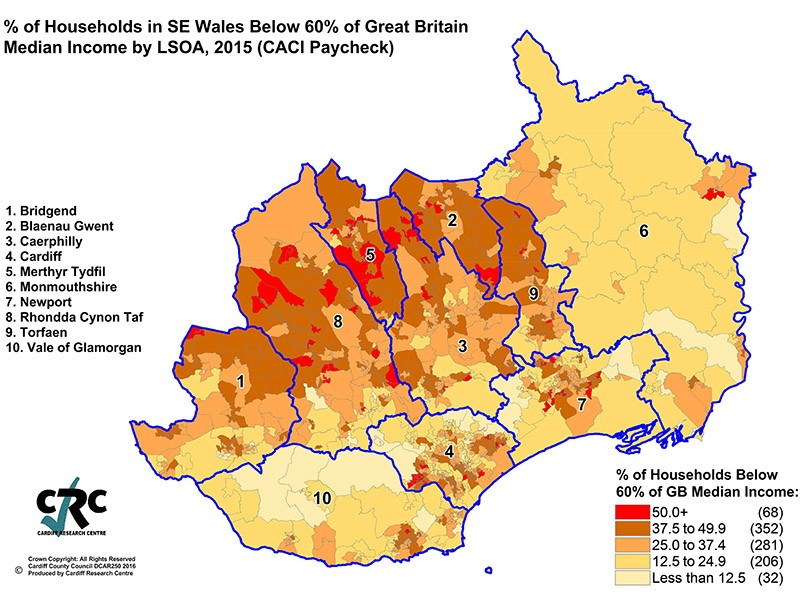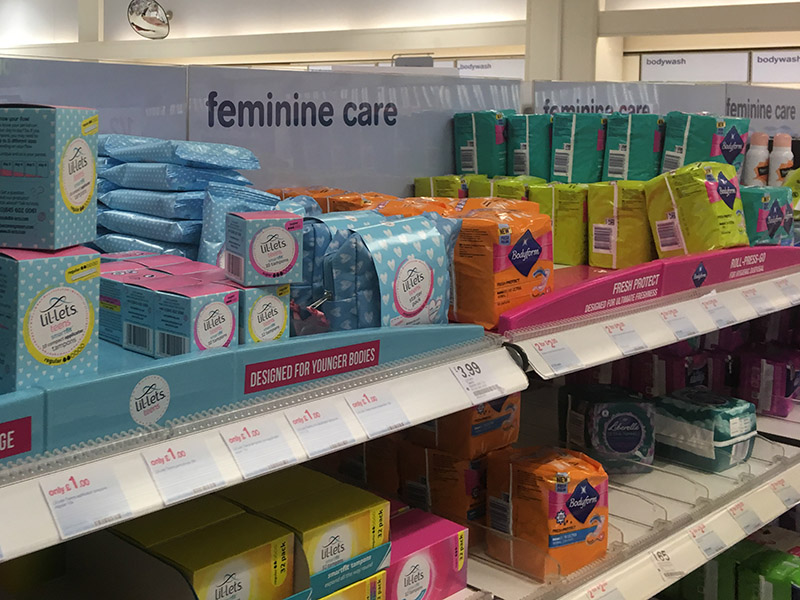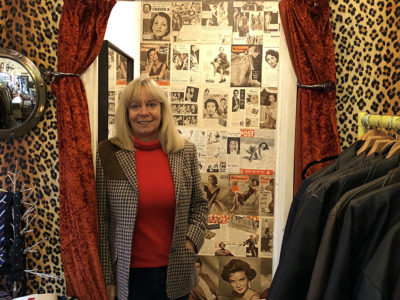The Red Box Project
The Red Box Project charity began in 2017 to tackle schools absences due to period poverty.
They fill red boxes with pants, tampons and sanitary towels and provide them to schools all over the country.
There are several Red Box Projects in Wales:
- Holyhead
- Lampeter
- Port Talbot
- Rhondda Cynon Taf
- South East Wales
- Swansea
- The Vale of Glamorgan (Barry)
- Torfaen
Sarah Donaldson, head of the South East Wales branch of the Red Box Project is now using her knowledge to help local authorities manage their budget.
She says, “I am currently working with Cardiff Local Authority as part of their pilot project with period dignity. I am also part of the task and finish group for Caerphilly council project into period poverty.”
The project has had nationwide success in preventing absences due to students being unable to afford sanitary wear.
One school in Portsmouth, where the project began, has noticed attendance has increased by nearly a third thanks to the Red Box Project. By getting the government involved Wales has taken a great step towards eradicating period poverty.
The Welsh government have finally secured funding to tackle period poverty in schools, but is the problem about more than just money?

The government hope to reduce absences by providing sanitary products for students
You check your calendar and see you are due on your period and the stress returns. You wonder if you’ll get into trouble for missing the English test on Tuesday – but what option do you have when you cannot afford sanitary products?
A recent study by onepoll.com, commissioned by Always, revealed every year 137,000 girls miss school because they cannot afford sanitary products.
However, on 23 March 2018, the Welsh government announced a £1 million grant to tackle period poverty in Wales. Included in this grant is £700,000 capital funding.
“The capital funding was specifically to improve school facilities to ensure dignity for young people in managing their periods,” says Sally Hunt, the senior child poverty manager in the Welsh government.
Children’s charity Plan International UK discovered this money is desperately needed. Their study revealed one in ten girls aged between 14-21 have been unable to afford sanitary products.
The grant has been given to local authorities to spend, as they are best placed to identify where period poverty is worst. They are expecting reports back on its progress next month.
“We have asked local authorities for feedback on how this money has been spent,” Sally continues. “The monitoring forms are currently being received and the Leader of the House hopes we will uncover good practice that can be shared across Wales.”
Prominent Period Poverty
Outside of Cardiff, Rhondda Cynon Taff has the largest number of households with an income below the 60% GB median.

This map highlights the density of poverty in South East Wales
“There’s a lot of deprivation within Rhondda Cynon Taff, we’re one of the most deprived counties,” says Rhondda Cynon Taff councillor, Shelley Rees-Owen.
Shelley chairs the Children and Young People’s scrutiny committee, who were tasked with tackling period poverty in Rhondda Cynon Taf before the grant existed.
Her group sent out questionnaires to understand the gravity of the issue. Shelley says, “People said their mum couldn’t afford to buy them sanitary products, so they would use a sock or another item of clothing.”
The results became part of a wider report Shelley and her team put together for her council. This later caught the attention of the Welsh government who then organised the grant.
“Their mum couldn’t afford to buy them sanitary products, so they would use a sock or another item of clothing.” – Cllr Shelley Rees-Owen
A 13-year-old-student from the Rhondda Cynon Taf authority says her school has just received sanitary products from the government grant. She thinks having free sanitary products is a good idea, but she hasn’t been told how long the provision will last.
Bleeding the funds dry
Shelley also raised a concern about the inadequacy of the funding, “When the Welsh government gave a particular sum and divided it to all the local authorities it wouldn’t have been enough.”
In addition, Sally Hunt says the funding for period products is only until 2020. “No decision has been made as yet on future funding,” she explains.
Shelley hopes the local authorities’ feedback will be enough to encourage long-term provision, as her report showed a unanimous agreement towards sanitary provision being as freely available as toilet roll.
“No decision has been made as yet on future funding,” – Sally Hunt, senior child poverty manager
Blood Gives Blood estimates a person with periods will spend, on average, £4,800 in a lifetime (just under £11 per month) on sanitary products. However, this doesn’t include additional costs to replace pants or bedding and medicine.
A lot of people who have periods find the most cost-effective way to afford their period is to buy sanitary products in bulk when they are on offer.

Most women bulk buy products when they are on offer to save money in the long-term.
Many are now investing in menstrual cups or period pants which are both eco-friendly and reusable. This reduces the monthly cost and contributes less waste, but liners are also necessary as the products are not foolproof.
However, the average cost of period pants or a menstrual cup is upwards of £20, an investment too steep for those in poverty.
Could more be done?
The findings of the Rhondda Cynon Taf’s Children and Young People’s scrutiny report not only highlighted an issue with period poverty, but a poverty in period education.
“One thing the pupils were telling us was they want lessons on periods in front of boys,” Shelley explains. “They think the boys should be present because they’re going to be husbands, fathers, employers so they need to understand periods.
“They really want to see the education improved and for male members of staff as well. We came across a lot of stories where they weren’t allowed to go to the toilet during lessons.”
She continues to explain once the funding is all running smoothly she plans to talk with the director of education to tackle the issue with education. In addition, the findings from the report unanimously agreed everyone who has a period should have access to products as they do with toilet roll, regardless of whether they can afford them or not.
The government has made a good start. However, if absences due to period poverty are to be tackled effectively, it needs to ensure funding continues past 2020.
Following this, education needs to be provided so future generations can understand the necessity for products and the burden of the cost, as well as the side effects.
Shelley says “If you’re looking at just tackling period poverty, you’re into the realm of means testing and we didn’t want to be doing that. What we are after is a universal provision so anyone who needs to access the provision has it.
When I know it’s all running smoothly, I will be looking to the director of education to finalise work in terms of the education because it was equally important to the pupils.”
The Red Box Project
The Red Box Project charity began in 2017 to tackle schools absences due to period poverty.
They fill red boxes with pants, tampons and sanitary towels and provide them to schools all over the country.
There are several Red Box Projects in Wales:
- Holyhead
- Lampeter
- Port Talbot
- Rhondda Cynon Taf
- South East Wales
- Swansea
- The Vale of Glamorgan (Barry)
- Torfaen
Sarah Donaldson, head of the South East Wales branch of the Red Box Project is now using her knowledge to help local authorities manage their budget.
She says, “I am currently working with Cardiff Local Authority as part of their pilot project with period dignity. I am also part of the task and finish group for Caerphilly council project into period poverty.”
The project has had nationwide success in preventing absences due to students being unable to afford sanitary wear.
One school in Portsmouth, where the project began, has noticed attendance has increased by nearly a third thanks to the Red Box Project. By getting the government involved Wales has taken a great step towards eradicating period poverty.





